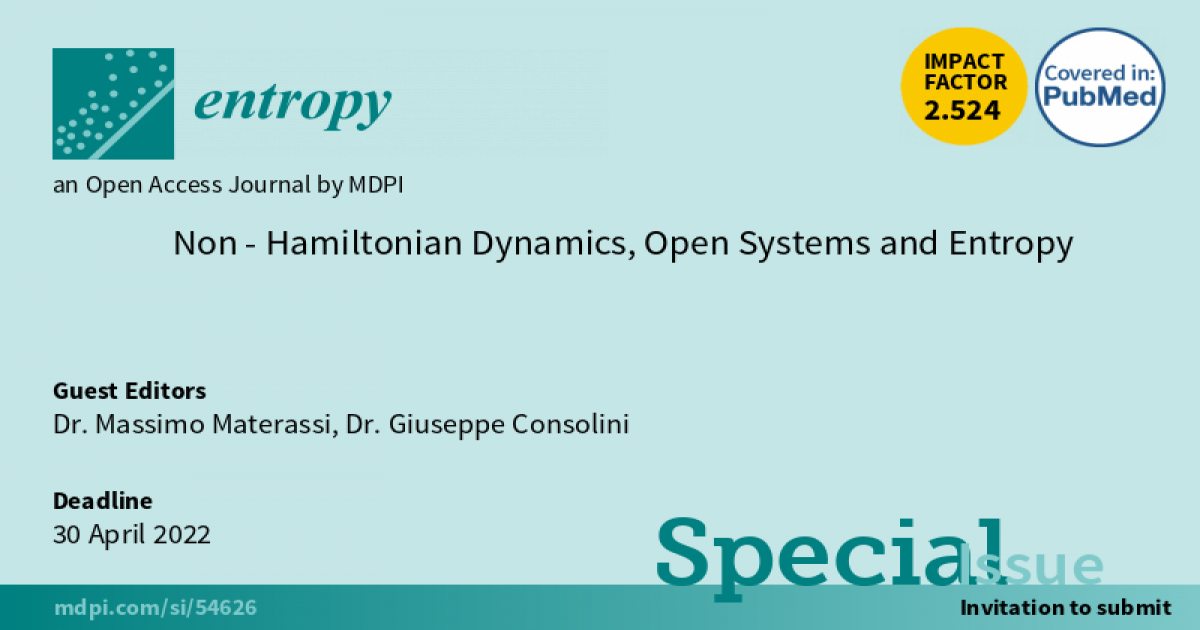- 2.0Impact Factor
- 5.2CiteScore
- 22 daysTime to First Decision
Non-Hamiltonian Dynamics, Open Systems and Entropy
This special issue belongs to the section “Multidisciplinary Applications“.
Special Issue Information
Dear Colleagues,
In Hamiltonian systems, the dynamics, expressed in terms of Poisson brackets, results in a purely algebraic construction, a matter of differential geometry and topology. Algebrization of dynamics is also the simplest path to quantization, as stated by Dirac’s isomorphism, mapping the classical Poisson bracket algebra of Hamiltonian systems into the algebra of commutation brackets of quantum observables.
Classical systems with dissipation and open quantum systems are non-Hamiltonian systems, and the problem of their algebrization is currently under the spotlight. Classical systems in which dissipation coexists with a Hamiltonian structure are algebrized as metriplectic systems, or in the equivalent scheme named GENERIC, more focused on tensor operators. Open quantum systems are described with the celebrated Lindblad equations, showing striking analogies with the classical metriplectic formalism.
An excellent point about non-Hamiltonian dynamics is the role apparently played by entropy-like quantities: in classical metriplectic systems, the entropy of the medium draining mechanical energy via dissipation generates the irreversible part of dynamics. In quantum open systems, entanglement plays the role of coupling the system with the environment, giving rise to its classical properties, in a suitable macroscopic limit.
In this Special Issue, contributions will be collected on the unifying role of entropy-like quantities in algebrized dynamics of non-Hamiltonian systems, both classical and quantum. In particular, the objective is that of investigating the general relationship between irreversibility and classical behaviour, and the appearance of information-like quantities in the dynamics.
Dr. Massimo Materassi
Dr. Giuseppe Consolini
Guest Editor
Manuscript Submission Information
Manuscripts should be submitted online at www.mdpi.com by registering and logging in to this website. Once you are registered, click here to go to the submission form. Manuscripts can be submitted until the deadline. All submissions that pass pre-check are peer-reviewed. Accepted papers will be published continuously in the journal (as soon as accepted) and will be listed together on the special issue website. Research articles, review articles as well as short communications are invited. For planned papers, a title and short abstract (about 250 words) can be sent to the Editorial Office for assessment.
Submitted manuscripts should not have been published previously, nor be under consideration for publication elsewhere (except conference proceedings papers). All manuscripts are thoroughly refereed through a single-blind peer-review process. A guide for authors and other relevant information for submission of manuscripts is available on the Instructions for Authors page. Entropy is an international peer-reviewed open access monthly journal published by MDPI.
Please visit the Instructions for Authors page before submitting a manuscript. The Article Processing Charge (APC) for publication in this open access journal is 2600 CHF (Swiss Francs). Submitted papers should be well formatted and use good English. Authors may use MDPI's English editing service prior to publication or during author revisions.
Keywords
- dissipation
- irreversibility
- non-Hamiltonian systems
- open quantum systems
- metriplectic dynamics
- GENERIC formalism
- non-equilibrium thermodynamics
- Lindblad equations
- entanglement and quantum entropy
- emergence of thermodynamics

Benefits of Publishing in a Special Issue
- Ease of navigation: Grouping papers by topic helps scholars navigate broad scope journals more efficiently.
- Greater discoverability: Special Issues support the reach and impact of scientific research. Articles in Special Issues are more discoverable and cited more frequently.
- Expansion of research network: Special Issues facilitate connections among authors, fostering scientific collaborations.
- External promotion: Articles in Special Issues are often promoted through the journal's social media, increasing their visibility.
- e-Book format: Special Issues with more than 10 articles can be published as dedicated e-books, ensuring wide and rapid dissemination.


